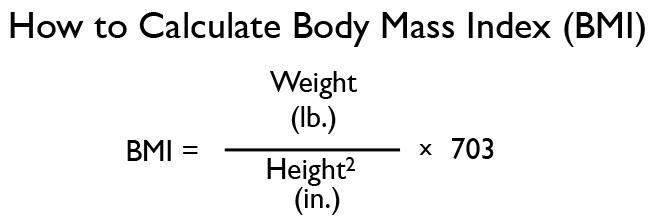Obesity, Weight Loss, and Joint Replacement Surgery
Article Featured on AAOS
If you need total knee or total hip replacement surgery—and your weight is significantly higher than it should be—your doctor may advise you to lose weight before your procedure. Even though you may feel fit and healthy at your current weight, studies show that a patient with a BMI greater than 40 is more likely to experience serious complications both during and after surgery than a patient of normal weight. Your doctor wants you to be aware of these risks so that you can take steps to minimize them before your procedure.
What is BMI?
BMI is a measure of body fat based on height and weight. Typically, the higher your BMI, the more body fat you have. Your doctor will use the following calculation to determine your BMI:
For an adult, the following BMI ranges apply:
| BMI Ranges | Weight Status |
|---|---|
| 18 to 24 | Normal |
| 25 to 29 | Overweight |
| 30 to 39 | Obese |
| 40 to 49 | Morbidly obese |
Health Conditions That May Impact Surgery
Patients with obesity are more likely to have certain diseases and health conditions that increase the risks of surgery. These include:
- Cardiovascular disease, including high blood pressure
- Type 2 diabetes
- Obstructive sleep apnea
- Metabolic syndrome—a group of health conditions that increase your risk for developing cardiovascular disease and type 2 diabetes
It is important to be in the best health possible before your surgery. If you have one of these conditions, your doctor will work with you to ensure that it is managed and under control before your procedure.
Increased Risk of Complications
There are risks associated with every surgery. However, some risks are greater for patients with obesity.
Complications During Surgery
Anesthesia. It is more difficult to administer anesthesia to a patient with obesity. Complications may be due to the patient’s body shape and anatomy, or to health conditions that can affect breathing. Challenges for the anesthesiologist include:
- Locating veins to administer general anesthesia and necessary medications
- Ensuring that oxygen and airflow are sufficient
- Properly positioning the needle when delivering spinal and epidural nerve blocks and other types of regional anesthesia
Operative times. There are technical challenges associated with performing surgery on a patient with obesity, so operative times are often longer. In general, the longer you are in surgery, the greater your risk of experiencing complications.
Complications After Surgery
Compared with a patient of normal weight, a patient with obesity is more likely to experience the following complications after surgery:
- Infection
- Poor wound healing
- Difficulty breathing
- Blood clots
- Pulmonary embolism—a blood clot in the lungs
Lesser Outcomes after Joint Replacement
Joint replacement will help relieve your pain and enable you to live a fuller, more active life. However, if you have obesity, you may never achieve the increased mobility and range of motion experienced by a patient of normal weight.
You may also experience more implant and prosthesis complications after surgery, including:
- Component loosening and failure
- Dislocation of the replacement joint, especially in the hip
In some cases, a second “revision” surgery may be necessary to remove failed implants and replace them with new ones.
Reducing Your Risks
In most cases, total hip and total knee replacement are elective procedures. For this reason, your doctor may recommend that you try nonsurgical treatments—such as medications and physical therapy—in order to delay your joint replacement surgery. This will give you time to lose weight and reduce your BMI before your procedure.
Losing Weight
The key elements to losing weight are diet and exercise. In general, you should try to make the following lifestyle changes:
- Reduce your fat and calorie intake. Try to eat meals that are full of fruits, vegetables and whole grains, lean meats, and low-fat dairy. Drink plenty of water and avoid sugary drinks that are high in calories.
- Get more physical activity and exercise. If you have constant hip or knee pain, you may not be as active as you were before. Low-impact activities—such as swimming, biking, or using an elliptical machine—will put less strain on your joints than strenuous exercise and will still be effective in helping you lose weight.
Making a Change Now
Patients who need joint replacement surgery often intend to lose weight after their procedure—when their relief from pain will enable them to be more physically active.
In reality, however, studies show that just a small percentage of patients with obesity actually lose weight after joint replacement—the majority of patients maintain the same BMI after surgery.
Rather than waiting, there is great value in establishing a healthier lifestyle now—before your joint replacement surgery. Losing weight and reducing your BMI will decrease your risk for complications and increase the likelihood of a successful surgical outcome. In some cases, it may also decrease your pain to the point where joint replacement may no longer be needed—or can be put off for a number of years.
Work with Your Doctor
Although reaching and staying at a healthy weight can be a long-term challenge, the payoff is significant. If you need help losing weight and lowering your BMI before joint replacement surgery, talk to your primary care doctor. He or she can recommend specific low-impact exercises and activities and help you choose a commercial weight-loss plan that fits your needs and lifestyle.
Orthopedic & Sports Medicine Center of Oregon is an award-winning, board-certified orthopedic group located in downtown Portland Oregon. We utilize both surgical and nonsurgical means to treat musculoskeletal trauma, spine diseases, sports injuries, degenerative diseases, infections, tumors and congenital disorders.
Our mission is to return our patients back to pain-free mobility and full strength as quickly and painlessly as possible using both surgical and non-surgical orthopedic procedures.
Our expert physicians provide leading-edge, comprehensive care in the diagnosis and treatment of orthopedic conditions, including total joint replacement and sports medicine. We apply the latest state-of-the-art techniques in order to return our patients to their active lifestyle.
If you’re looking for compassionate, expert orthopedic surgeons in Portland Oregon, contact OSM today.
Phone:
503-224-8399
Address
1515 NW 18th Ave, 3rd Floor
Portland, OR 97209
Hours
Monday–Friday
8:00am – 4:30pm





